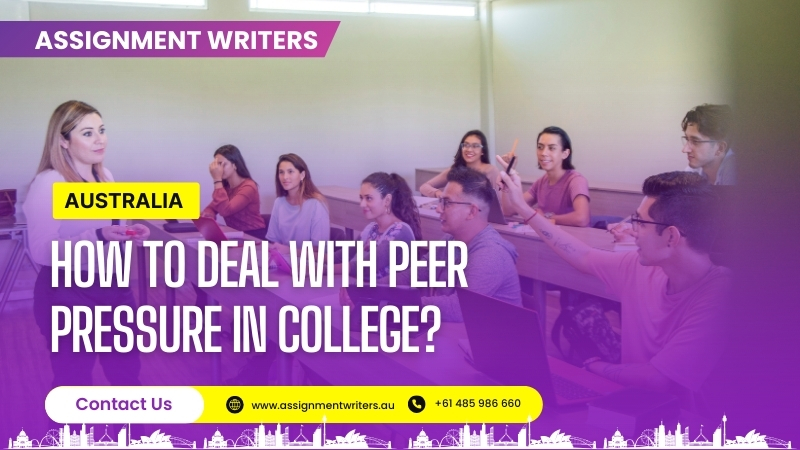College is an important life experience that is often an exciting yet daunting experience. As students transition from childhood into adulthood, new experiences, potential new responsibilities, and new relationships are all part of that process.
One of the challenges during that transition is peer pressure. Yearning to “fit or”, to be accepted, and or feel a part of a group can lead to decision-making that does not align with students' values.
Being aware of the developmental aspect regarding how to respond during college under peer pressure is important for their development and for managing the mental health of maintaining the importance of students' education.
We will examine some of the broader scope regarding students' challenges of being a college student, also the need for student mental health, and possible mechanisms and strategies of avoiding the negativity of peer pressure in college.
Understanding Peer Pressure in the College Context
There is a risk of peer pressure when you are surrounded by:
- Different groups of people and cliques that you might not have been exposed to in high school
- New ways of thinking, living, and lifestyles
- Typically more independence while not being held to a higher level of accountability
- The will to fit in and make friends. To be accepted by individuals is more important to you. But peer pressure may not always be negative.
Positive peer pressure can push you to study harder, join an organisation that can help you in your academic and personal life, or even develop healthy behaviours. The goal is to figure out what is constructive peer pressure vs. destructive peer pressure.
College Life Challenges and Their Connection to Peer Pressure
Note that having peer pressure can be exacerbated through the college-life environment. College life challenges can heighten peer pressure for a lot of students, and create emotional vulnerability in their lives to be influenced. Some of the typical challenges college students face are:
Academic Pressure: Doing school work at the college level-- often students take courses that may be completely new to them and compared to their peers (who might look like they have it all together), can be easy to lose your focus and be influenced by others' choices.
Financial Pressure: Balancing tuition costs, rent, and basic needs to live often requires a part-time job, and usually contributes to undue stress while also providing less time for social events which can result in feelings of loneliness and isolation.
Social Adjustments: Trying to develop friendships and managing romantic relationships can be an overwhelming process. Students often feel pressures that arise from fear of missing out (FOMO), leading them to participate in things they are uncomfortable with.
Time Management: Students have to balance multiple classes, assignments, part-time jobs, and their social life within a very limited time, which demands smart planning. Poor time management can cause students to fall behind academically, which can lead to increased anxiety.
Identity Exploration: Colleges stand as a great place for students to identify themselves as humans. Their college life has a great influence on their overall personality and who they are shaping themselves to be for the future.
The Impact of Peer Pressure on Student Mental Health
Peer pressure has a considerable effect on student mental health. What may seem like normal and occasional peer pressure can lead to issues related to chronic peer pressure. These can include:
Anxiety and Panic Attacks: The energy put into trying to fit in can create a cycle of excessive and chronic stress.
Depression: Not feeling like you have a real place to belong or feeling like you must front a different version of yourself to fit in and socialise can create cumulative emotional exhaustion.
Substance Use: Students sometimes pursue rates of normal and abnormal alcohol and drug use, and other risk-taking behaviours, in response to normal peer pressure.
Eating Disorders: The sheer amount of pressure to be a certain size and eating accordingly adds to the likelihood of developing problems related to body image and eating.
Burnout: Commitments under peer pressure can lead to burnout and exhaustion of the body and mind.
More colleges are starting to recognise the issue and develop mental health resources. But the best solution is prevention by creating awareness to engage in empowerment.
Proven Strategies to Deal with Peer Pressure in College
Here are some well-known strategies for students looking forward to dealing with peer pressure in colleges -
1. Define Your Core Values
Take a few minutes and write down your goals, your values, and the things you will not compromise on. Being aware of what you stand for makes it easy to identify when something is not in line with your values.
2. Build a Supportive Social Network
Introduce yourself to people who are supportive of your decisions and desire to see you do well. Healthy relationships can mitigate negative peer pressure and provide a secure environment for open dialogue.
3. Practice Saying No
'Saying no assertively doesn't require being rude. Learn some polite but assertive ways of saying no, such as:
"I'm not comfortable with that."
"Thanks, but I've got other plans."
"I'm not really into that scene."
Practicing in front of a mirror or with a friend can improve your certainty in saying no.
4. Plan Your Time Wisely
Design a balanced schedule that includes academics, personal care, and socialising. When you have a plan, you are less likely to be tempted into bad decisions.
5. Avoid High-Risk Situations
It is okay to avoid settings that influence bad decisions or lead to peer pressure on a regular basis. You do not owe anyone an explanation for deciding to do what is best for you.
6. Engage in Positive Peer Groups
Find clubs, service organisations, or academic societies in which you feel engaged and connected. These positive peer groups generally model healthy places to hang out with friends or make new friends.
7. Seek Professional Help When Needed
If peer pressure is affecting your mental health, don’t hesitate to seek help from a counselor or mental health professional. Early intervention can prevent long-term issues.
Avoiding Bad Influence in College: A Guide to Self-Preservation
The best way to cope with peer pressure is to abstain from bad influence in college. Here are some ways to identify toxic influences and distance yourself from them:
- Be cognizant of your feelings: Do you find that you consistently feel anxious, guilty, or inadequate near certain people- that may be a sign.
- Recognise patterns: Are you altering your values or dismissing responsibilities only when you are with certain individuals or a group.
- Listen to your intuition: if it feels unpleasant, it's probably wrong.
- Look at your relationships: do you spend time with friends who uplift you and push you forward or friends who drain your energy and make you doubt your choices?
- Use social media on purpose: unfollow or mute accounts that create impossible standards and encourage negative comparison only you.
By intentionally avoiding toxic influences, you open space for growth, confidence, and authentic friendships.
Using Peer Influence Positively
Not all peer influence is negative. You can also positively connect to peer influence. Be the person who positively influences others:
- Encourage friends to go to class, study with them, and make healthful choices
- Celebrate one another's victories and achievements together
- Provide emotional support during hard times
- Be a proponent of inclusive and respectful behaviours in your social groups
When you support a healthy social environment, you not only support yourself but others too.
Building Resilience Against Peer Pressure
Resilience is when you are able to bounce back from struggles. You can develop resilience by recognising your needs:
Reflect on yourself: Journaling or meditating allows you to remain in contact with your values.
Learn coping strategies: beat stress through hobbies, breathing exercises, or a call with a mentor.
Embrace growth: As you go through life, you will make mistakes.
Mistakes are learning moments: there is no shame in figuring things out. Don't be too hard on yourself. Resilient students are less likely to yield to the negative effects of peer pressure.
Conclusion: Own Your College Experience
Navigating peer pressure in college is a skill that requires awareness, bravery, and intention. While the urge to fit in is strong and natural, we must always keep in mind that we can truly belong only when we are accepted for who we are.Your college years are when you will discern your passions and make them the keystone of your values, and will establish many relationships that may last a lifetime. By simply considering the challenges of college life, being mindful of your mental health as a student, and being intentional about avoiding bad influences during college, you are preparing yourself to thrive in all areas of your life as a student. Say yes to growth, confidence, and authenticity, and say no to anything that takes you away from becoming the best version of yourself.

